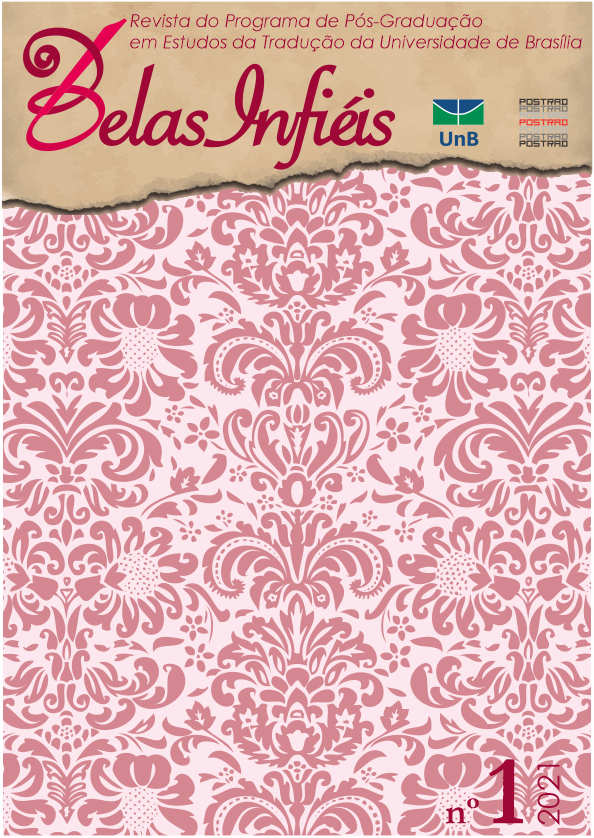Sobre a literatura russa em tradução no Brasil: Entrevista com Denise Regina de Sales
DOI :
https://doi.org/10.26512/belasinfieis.v10.n1.2021.34604Mots-clés :
Tradução literária. Literatura russa no Brasil. Entrevista.Résumé
Apresentamos uma entrevista com Denise Regina de Sales, professora, pesquisadora e tradutora cujo repertório de traduções do russo ao português incluem obras de autores renomados, tais como: Fiódor Dostoiévski, Anton Tchékhov e Ivan Turguêniev. Além das obras desses autores, seu repertório inclui ainda traduções de escritores como Mikhail Zóchtchenko, Vladímir Voinóvitch, Valentin Katáiev, Aleksandr Grinevsky e Varlam Chalámov, as duas últimas em parceria com Graziela Schneider e Elena Vasilevich, respectivamente. Entre suas traduções do russo, figura ainda A revolução das mulheres, volume organizado por Graziela Schneider com artigos, atas, panfletos e ensaios escritos por autoras russo-soviéticas sobre a emancipação e a condição das mulheres. Do português ao russo, Denise Regina de Sales traduziu, em parceria com Elena Vasilevich, o conto “O mate do João Cardoso”, de Simões Lopes Neto. No momento, realiza a tradução, a partir do russo, de trechos de uma novela de Galina Keptuké (1951-2019), escritora e tradutora cuja língua pertence ao ramo tungúsico da família altaica, falada pelos evenques, povo nômade que vive no Norte da Ásia, na região fronteiriça da Rússia, China e Mongólia. A entrevista nos foi concedida por e-mail de junho a agosto de 2020 e aborda questões que perpassam a tradução do russo ao português. Regina nos falou também de suas experiências acadêmicas e sobre sua posição teórica no que concerne o fazer tradutório. Nosso objetivo duplo foi conhecer um pouco mais sobre as questões que envolvem o mercado de tradução das obras escritas em língua russa e seus estudos e ensino no Brasil.
Téléchargements
Téléchargements
Publié-e
Comment citer
Numéro
Rubrique
Licence
(c) Tous droits réservés CC BY 2021

Cette œuvre est sous licence Creative Commons Attribution 4.0 International.
Copyright Statement
Given the public access to this journal, the texts are free to use but requires the recognition of the original authorship and initial publication in this journal to be properly stated.
The journal allows the use of works published for non-commercial purposes, including the right to submit the work to publicly accessible databases. Published contributions are the sole and exclusive responsibility of the author(s).
- When submitting papers to be evaluated by the Belas Infiéis journal, the author(s):
- Declare that the contents of the contributions are original and of their original creation, being entirely responsible for their content if there is an objection by third parties.
- Claim to be aware that they should not commit academic plagiarism.
- Declare that the manuscript has not been published, completely or partially, in Portuguese or another language. If it is a translation it should be submitted to the Translated Articles section.
- Declare that the manuscript is not being evaluated by other journals.
- Declare that the manuscript was not submitted to another journal simultaneously.
- Commit(s) to inform the journal of any kind of error or inaccuracy in their contribution (published, in evaluation or in editing) and to collaborate with the editors to make due corrections of the article (when in evaluation or editing) or erratum/retraction (after publication).
- Declare that there is no conflict of interest regarding the published work.
- Authorize its release if it is accepted for publication without any kind of monetary compensation.
- Agree to assign non-exclusive rights to publication to the magazine, remaining free to make their contribution available in other media as long as the publication of the first version in Belas Infiéis magazine is mentioned. They also authorize Belas Infiéis to assign their texts for reproduction in content indexers, virtual libraries and similar platforms.
- Maintain copyright and grant the journal the right of first publication, the work being licensed under theCreative Commons Attribution License.
- Is/Are allowed and encouraged to publish and distribute their work online after the editorial process, which may increase the impact and citation of the published work.
- Authorize the editorial team to make textual adjustments and to adapt the article to the publication rules, when necessary.



















